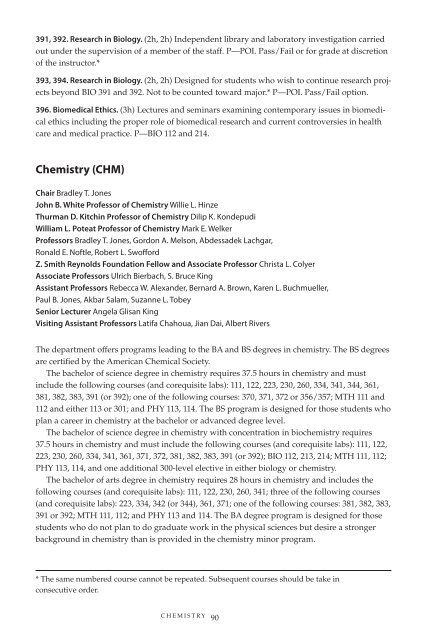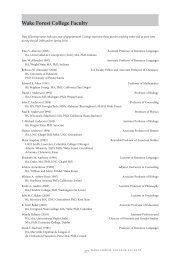theundergraduateschoo ls - Wake Forest University
theundergraduateschoo ls - Wake Forest University
theundergraduateschoo ls - Wake Forest University
You also want an ePaper? Increase the reach of your titles
YUMPU automatically turns print PDFs into web optimized ePapers that Google loves.
391, 392. Research in Biology. (2h, 2h) Independent library and laboratory investigation carried<br />
out under the supervision of a member of the staff. P—POI. Pass/Fail or for grade at discretion<br />
of the instructor.*<br />
393, 394. Research in Biology. (2h, 2h) Designed for students who wish to continue research projects<br />
beyond BIO 391 and 392. Not to be counted toward major.* P—POI. Pass/Fail option.<br />
396. Biomedical Ethics. (3h) Lectures and seminars examining contemporary issues in biomedical<br />
ethics including the proper role of biomedical research and current controversies in health<br />
care and medical practice. P—BIO 112 and 214.<br />
Chemistry (CHM)<br />
Chair Bradley T. Jones<br />
John B. White Professor of Chemistry Willie L. Hinze<br />
Thurman D. Kitchin Professor of Chemistry Dilip K. Kondepudi<br />
William L. Poteat Professor of Chemistry Mark E. Welker<br />
Professors Bradley T. Jones, Gordon A. Me<strong>ls</strong>on, Abdessadek Lachgar,<br />
Ronald E. Noftle, Robert L. Swofford<br />
Z. Smith Reynolds Foundation Fellow and Associate Professor Christa L. Colyer<br />
Associate Professors Ulrich Bierbach, S. Bruce King<br />
Assistant Professors Rebecca W. Alexander, Bernard A. Brown, Karen L. Buchmueller,<br />
Paul B. Jones, Akbar Salam, Suzanne L. Tobey<br />
Senior Lecturer Angela Glisan King<br />
Visiting Assistant Professors Latifa Chahoua, Jian Dai, Albert Rivers<br />
The department offers programs leading to the BA and BS degrees in chemistry. The BS degrees<br />
are certified by the American Chemical Society.<br />
The bachelor of science degree in chemistry requires 37.5 hours in chemistry and must<br />
include the following courses (and corequisite labs): 111, 122, 223, 230, 260, 334, 341, 344, 361,<br />
381, 382, 383, 391 (or 392); one of the following courses: 370, 371, 372 or 356/357; MTH 111 and<br />
112 and either 113 or 301; and PHY 113, 114. The BS program is designed for those students who<br />
plan a career in chemistry at the bachelor or advanced degree level.<br />
The bachelor of science degree in chemistry with concentration in biochemistry requires<br />
37.5 hours in chemistry and must include the following courses (and corequisite labs): 111, 122,<br />
223, 230, 260, 334, 341, 361, 371, 372, 381, 382, 383, 391 (or 392); BIO 112, 213, 214; MTH 111, 112;<br />
PHY 113, 114, and one additional 300-level elective in either biology or chemistry.<br />
The bachelor of arts degree in chemistry requires 28 hours in chemistry and includes the<br />
following courses (and corequisite labs): 111, 122, 230, 260, 341; three of the following courses<br />
(and corequisite labs): 223, 334, 342 (or 344), 361, 371; one of the following courses: 381, 382, 383,<br />
391 or 392; MTH 111, 112; and PHY 113 and 114. The BA degree program is designed for those<br />
students who do not plan to do graduate work in the physical sciences but desire a stronger<br />
background in chemistry than is provided in the chemistry minor program.<br />
* The same numbered course cannot be repeated. Subsequent courses should be take in<br />
consecutive order.<br />
C H E M I S T R Y 90






